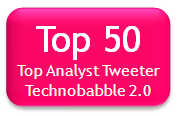“…transformation happens less by arguing cogently for something new than by generating active, ongoing practices that shift a culture’s experience of the basis for reality.” — Roz and Ben Zander, The Art of Possibility
The recent debates, at the Enterprise 2.0 Conference and in the blogosphere, about E2.0 and Social Business have made one thing clear to me. Too many of us dwell on the transformative aspects of social business. Myself included.
This is likely so because most organizations value other things more highly than their people and act accordingly. Their behaviors cry out for transformation to those who envision a better way of doing business.
However, achieving sweeping transformation of the way that people are considered and treated is the wrong goal for most organizations.
It is important to remember that not all companies wish to transform themselves into social businesses, much less anything else. In fact, most begrudgingly embrace transformation only when they are forced to do so by changes occurring around them.
Instead of concentrating on “big bang” transformation, we should seek to make a series of small changes to a business’s people practices and systems. In other words, leave the organization alone. Do not focus social change efforts directly on organizational structure or culture.
It is more effective to address specific policy, process, and technology problems at the individual or role level. Let those snowflakes of change add up on top of each other to create a snowball that, when put in motion, will continue to grow until it becomes an unstoppable force. Measure impact in the same additive manner instead of seeking the big, single instance of benefit favored by traditional ROI analysis.
Wondering where to start introducing social practices and technologies in your organization? Look around. What specific challenges are customers, employees, and partners turning to each other to overcome? How are they finding someone who can help, and how are they interacting once they have identified that person? How is what they have learned shared with others?
Now imagine and investigate ways that your organization can help all of its constituents work together to solve those problems faster and less expensively. Be sure to consider technology that enables this, but do not forget to examine policy and process changes that could help too.
That is the way to improve your organization while recognizing and supporting its existing, inherent social nature. Forget about large-scale transformation. Focus instead on using people power to solve specific problems and challenges that, while small by themselves, add up to a significant gain for the business when addressed and overcome.




Pingback: links for 2010-11-17 « burningCat
I disagree: social business is organizational and cultural transformation at its core. If you want to transform the way people work, then you have to tie that to how they are empowered to get their job done, with the approvals from their direct supervisors all the way up and down the organizational ladders. Social Software by itself does nothing to help empower workers, but the activities and efforts that put into using such Enterprise 2.0 platforms. That time commitment requires “blessings” visavi top-down tacit approvals from leadership. Without it, it is almost impossible to reach critical-mass to achieve the effect social software was meant to do.
I agree that small, slow demonstrative wins is key, and change needs to be slow, but you cannot seperate the organizational and cultural change with the advent of successful emergent social business software.
Agile is the word I think you are looking for.
Outstanding post Larry…Oscar Berg is riding the same wave:
“…design and implement for adoption, not a fully realized vision from the start…focus efforts on key use cases where small changes in existing practices can make a big difference”
And it fits nicely with Peter Bregman’s post on changing one thing at a time:
Here’s my riffing
…lots of what I say, you already say here
All this also ties in with Loss Aversion
John: Thanks! I’ve noticed that we often are on the same wavelength in our approach to organizational practices. I really appreciate your pointing readers to additional resources addressing the topic of post, as well as related ones. Cheers!
Pingback: E L S U A ~ A KM Blog Thinking Outside The Inbox by Luis Suarez » Taking Notes Episode 126: Introducing Social Business with Luis Suarez
Pingback: E L S U A ~ A KM Blog Thinking Outside The Inbox by Luis Suarez » Enterprise 2.0 vs. Social Business – The Final 2.0 Transformation
Pingback: Transformational Change | sean f burns
Pingback: How Data Analytics and BI Professionals Used Twitter in November | Trends and Outliers
有松絞り 浴衣